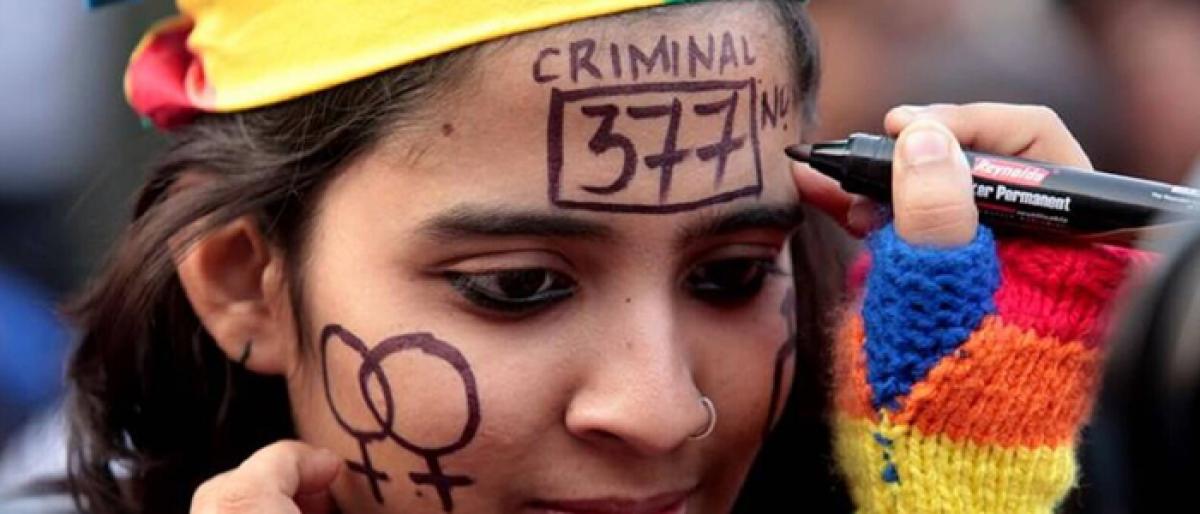Live
- Donate Blood, Save Lives: BJP Hosts Mega Blood Donation Camp in Aiza
- Azerbaijani Airliner Crashes Near Aktau, Kazakhstan: 32 Survive, Over 30 Feared Dead
- Union Minister Bandi Sanjay Kumar to Visit Jogulamba Gadwal District on December 27, 2024
- Gadwal Lawyers' United Protest: Opposition to District Court Relocation Gains Momentum
- Christmas Celebrations in Jogulamba Gadwal: A Festival of Unity, Charity, and Joy
- Lawyers Seek MP DK Aruna’s Intervention to Prevent District Court Relocation
- Israel, Hamas trade blame for delays in reaching Gaza ceasefire deal
- PM Modi, President Murmu extend Hanukkah greetings to Israeli counterparts
- Mohammad Abbas returns as Pakistan announce playing XI for Boxing Day Test vs South Africa
- Man Sets Himself on Fire Near Rail Bhawan in New Delhi, Investigation Ongoing
Just In

A 150yearold law that prescribes a life term in jail for gay sex is under spotlight as a fivejudge Constitution Bench on Tuesday began hearing a bunch of petitions that call for its scrapping The bench, however, said it would only examine the correctness of its verdict of 2013, which cancelled a Delhi High Court judgment that said the law criminalizing gay sex was unconstitutional
New Delhi: A 150-year-old law that prescribes a life term in jail for gay sex is under spotlight as a five-judge Constitution Bench on Tuesday began hearing a bunch of petitions that call for its scrapping. The bench, however, said it would only examine the "correctness" of its verdict of 2013, which cancelled a Delhi High Court judgment that said the law criminalizing gay sex was "unconstitutional".
As petitions for a relook into the 2013 order kept piling up, the top court decided to take a fresh look at the matter in January, citing changing "social morality". The bench said the curative petitions filed by it has a limited scope and would have to be heard by some other bench.
The apex court had in 2013 restored sexual relationship between persons of the same sex as a criminal offence by setting aside the 2009 Delhi High Court judgement that had held as unconstitutional section 377 of the IPC, which makes such actions between two consenting adults of same sex as a penal offence.
During the hearing on Tuesday, the bench, headed by Chief Justice Dipak Misra and comprising Justices R F Nariman, A M Khanwilkar, D Y Chandrachud and Indu Malhotra, said it would examine the constitutional validity of section 377 of the IPC and the fundamental rights of the LGBTQ (Lesbians, Gay, Bisexual, Transgender, Queer) community.
Section 377 refers to 'unnatural offences' and says whoever voluntarily has carnal intercourse against the order of nature with any man, woman or animal, shall be punished with imprisonment for life, or with imprisonment of either description for a term which may extend to 10 years, and shall also be liable to pay a fine.
When the hearing was about to commence on the batch of writ petitions, an advocate appearing for NGO Naaz Foundation, which was the first petitioner to approach the Delhi High Court in 2001 on the issue, sought permission to intervene.
It was on the petition filed by the Naaz Foundation that the Delhi High Court had decriminalised section 377 of the IPC, which was challenged in the apex court by some individuals and religious organisations. Even the Centre had at that time favoured retention of the provision in the IPC as penal offence.
The hearing began with senior advocate Mukul Rohatgi, appearing for dancer Navtej Jauhar, one of the petitioners, telling the court that the right to have sexual freedom should be examined in view of the nine-judge bench verdict on privacy which was delivered on August 24, 2017.
In the judgement on privacy as a fundamental right, the apex court's nine-judge bench had said the right to privacy cannot be denied to members of the LGBTQ community merely because they have unconventional sexual orientation and form a miniscule fraction of over 1.32 billion Indian population.
The bench, which agreed with the submission of Rohatgi, also said it would examine the fundamental right to life and sexual freedom. In the writ petitions too, there is a challenge to the 2013 judgement of the apex court by which homosexuality was held as a criminal offence.
The apex court had earlier refused to defer the hearing after the Centre sought more time to file replies on the PILs. Others who have filed petitions against section 377 are journalist Sunil Mehra, chef Ritu Dalmia, hotelier Aman Nath and business executive Ayesha Kapur.

© 2024 Hyderabad Media House Limited/The Hans India. All rights reserved. Powered by hocalwire.com







